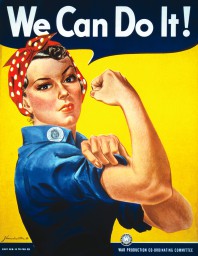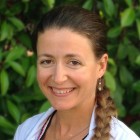 Women have played significant roles in healing fields throughout history. However they were not widely permitted to attend medical training programs until the late 1800s to the early 1900s. In 1930 women made up only 4.4% of students in medical schools. By 1990, women accounted for more than 36% of medical students, and now by 2017, 47.6% of medical school students in the United States are women. (Note: according to 2010 census data, 50.8% of the US population are female.) While this trend represents movement towards gender equality in education, there are far fewer women in most medical school faculty roles, surgical roles, and professional organization leadership positions. Thus, there continue to be opportunities for women to make history.
Women have played significant roles in healing fields throughout history. However they were not widely permitted to attend medical training programs until the late 1800s to the early 1900s. In 1930 women made up only 4.4% of students in medical schools. By 1990, women accounted for more than 36% of medical students, and now by 2017, 47.6% of medical school students in the United States are women. (Note: according to 2010 census data, 50.8% of the US population are female.) While this trend represents movement towards gender equality in education, there are far fewer women in most medical school faculty roles, surgical roles, and professional organization leadership positions. Thus, there continue to be opportunities for women to make history.
For women’s history month, let us take a moment to honor of all the women that have been pioneers in medicine. Below are a few historical highlights. We truly stand on the shoulders of giants!
- Merit Ptah (2700 CE) Egyptian “chief physician” and earliest woman named in medicine.
- Metrodora (around 200-400 CE) Greek physician. Authored the oldest medical book known to be written by a woman, On the Diseases and Cures of Women.
- Rufaida Al-Aslamia (approx 620 CE) Islamic medical social worker recognized as the first female Muslim nurse and first female surgeon in Islam.
- Hildegard of Bingen (1098-1179 CE) Prolific medieval era science and health writer considered Germany’s first female physician .
- Elizabeth Blackwell (1821 – 1910) First female physician in the United States. Graduated from New York’s Geneva Medical College in 1849. Cofounded the New York Infirmary for Women and Children.
- Florence Nightingale (1820-1910) Regarded as the founder of modern nursing, she was a statistician and reformer who transformed nursing after her experiences working in the Crimean War (1853-1856).
- Rebecca Lee Crumpler (1831-1895) First African American physician graduating from Boston University in 1864. Opened clinics to care for freed slaves who did not otherwise have access to medical care. Published Book of Medical Discourses.
- Florence Nightingale (1820-1910) Regarded as the founder of modern nursing, she was a statistician and reformer who transformed nursing after her experiences working in the Crimean War.
- Clara Barton (1821 – 1912) Founded the American Red Cross in 1881 after caring for soldiers in the Civil War.
- Maria Montessori (1870 – 1952) Italian physician and educator. Focus: pediatrics, women’s health, and the education system that she is most well known for: Montessori.
- Jane Elizabeth Hodgson (1915-2006) Minnesota based OB-GYN and pioneering provider of reproductive healthcare for women and advocate for women’s rights.
- Female Nobel Laureates who helped to progress science and medicine:
- Marie Curie (1867 – 1934) Nobel laureate in Chemistry in 1903 and 1911 for research in radiation and discovery of radon and polonium.
- Irene Joliot-Curie (1897 – 1956) Synthesis of radioactive compounds in 1935.
- Gerty Cori (1896 – 1957) Nobel laureate in 1947 in Physiology of Medicine for her research in the catalytic conversion of glycogen.
- Dorothy Crowfoot Hodgkin (1910 – 1994) X-ray techniques revealing structures of biochemical compounds in 1964.
- Rosalyn Sussman Yalow (1921 – 2011) radioimmunoassays of peptide hormones in 1977.
- Rita Levi-Montalcini (1909 – 1912) discoveries of growth factors, 1986.
- Gertrude B Elion (1918 – 1999) important principles of drug treatment, 1988.
- Christiane Nusslein-Volhard (1942 – ) discoveries in embryonic medicine, 1995.
- Linda Buck (1947 – ) Mechanisms of smell, 2004.
- Ada Yonath (1939 – ) Research about structure of ribosomes, 2009.
- Francoise Barre-Sinoussi (1947 – ) discovery of HIV, 2008.
- Elizabeth Blackburn (1948 – ) and Carol Greider (1961 – ) separate research on telomeres and chromosomes, 2009.
- May-Britt Moser (1963 – ) cells that create a positioning system in the brain, 2014.
- Tu Youyou (1930 – ) discoveries in a novel therapy against malaria, 2015.
As smart lady Laurel Thatcher Ulrich once said:
“Well behaved women seldom make history.”
Happy Women’s History Month!
Julia Strickler, ND* received her Doctorate of Naturopathy (ND) from Bastyr University in Seattle, WA. She also holds a BA in the History of Math and Science and Philosophy from St. John’s College in Annapolis, Maryland. Prior to practicing in Austin, her experience includes interning at The Chopra Center in Carlsbad, CA, working at The Texas Center for Biological Medicine in Dallas, and practicing at the Hawaii Naturopathic Retreat Center in Pahoa, Hawaii. In order to address any number of chronic conditions and lifestyle challenges, she also assists patients through nutrition, botanical medicine, homeopathy, hydrotherapy and mind-body awareness. A runner and aspiring yogi, she looks to balance the mind, body and spirit. She is available for home visits as well as office visits.
Selected references:
https://www.aamc.org/download/321526/data/factstableb1-2.pdf
http://www.feminist.org/research/medicine/ewm_toc.html
http://www.census.gov/prod/cen2010/briefs/c2010br-03.pdf
http://blogs.wsj.com/experts/2015/10/29/the-good-and-bad-statistics-on-women-in-medicine/
http://www.medicaldaily.com/most-influential-women-medicine-past-present-270560
http://www.nobelprize.org/nobel_prizes/lists/women.html
*Naturopathic doctors are not currently licensed in the state of Texas

